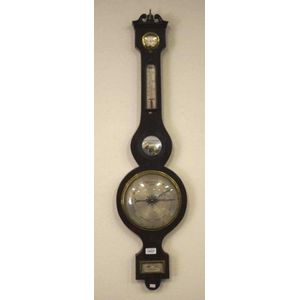Mahogany Wine Table with Brass Inlay and Tri-Form Base
You must be a subscriber, and be logged in to view price and dealer details.
Subscribe Now to view actual auction price for this item
When you subscribe, you have the option of setting the currency in which to display prices to $Au, $US, $NZ or Stg.
- Inlay - Decorative patterns inserted into the main body of a piece of furniture, generally in wood of contrasting colour and grain, though brass, ivory, ebony, shell and sometimes horn have been used. Inlay may consist of a panel of well figured timber inset into a cabinet door front, geometric patterns, or complex and stylized designs of flowers, swags of foliage, fruits and other motifs. As a general rule, in pieces where the carcase is constructed in the solid, the inlay is relatively simple such as stringing, cross banding and herringbone banding. Where more elaborate and decorative work was required veneer was used. Inlay has been fashionable from at least the latter half of the 17th century, when a variety of elaborate forms were developed
- Turning - Any part of a piece of furniture that has been turned and shaped with chisels on a lathe. Turned sections include legs, columns, feet, finials, pedestals, stretchers, spindles etc. There have been many varieties and fashions over the centuries: baluster, melon, barley-sugar, bobbin, cotton-reel, rope-twist, and so on. Split turning implies a turned section that has been cut in half lengthwise and applied to a cabinet front as a false decorative support.
- Mahogany - Mahogany is a dense, close grained red-coloured timber from the West Indies and Central America. It was first imported into Europe in the the early 18th century and its use continued through the 19th century. It was popular for furniture making because of its strength, the wide boards available, the distinctive grain on some boards, termed flame mahogany and the rich warm colour of the timber when it was polished.. The "flame" was produced where a limb grew out from the trunk of the tree, and this timber was usually sliced into veneers for feature panels on doors, backs and cornices.
Some terms used to describe mahogany relate to the country from which it originally came, such as "Cuban" mahogany, "Honduras" mahogany etc. However unless the wood has been tested the names assigned are more a selling feature, rather than a true indication of the timber's origin. - Column - An architectural feature sometimes used for decorative effect and sometimes as part of the supporting construction. Columns should generally taper slightly towards the top. They may be plain or decorated with carving, fluting or reeding. Columns may be fully rounded or, more commonly, half-rounded and attached with glue, screws or pins to the outer stiles of doors, or the facing uprights on cabinets and bureaux.
This item has been included into following indexes:
Visually similar items

A brass adjustable shaving mirror, English, circa 1900, approx. 55 cm high

A George I Britannia standard footed salver, by Christopher Canner II, London 1719 raised on a stepped circular foot, the salver centred with a coat of arms, diameter 14.5 cm, weight 194gms., The arms of Henchman or Hinchman of Northampton, impaling Lawren

Antique oval swing bedroom mirror 75 cm high approx

Victorian wall barometer weather station, wood based bracket containing barometer and thermometer, with needle indicator to top weather forecast dial requiring reattachment. Marked for 'M.H. Harris, Penzance,' to base. Length 101 cm
